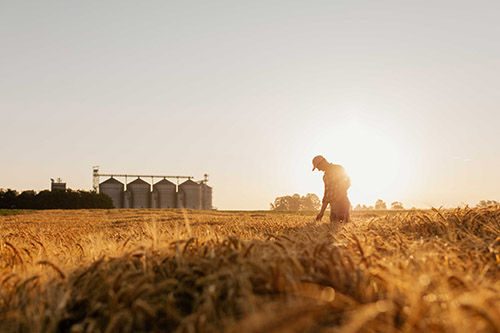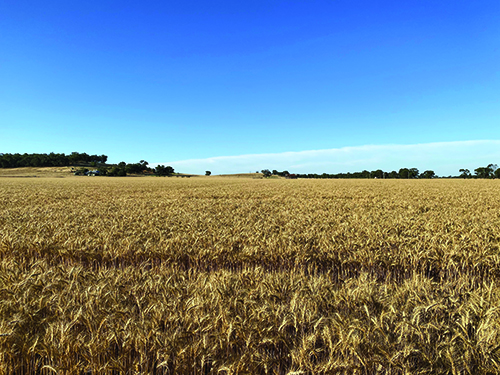Cool Soil Initiative
The Challenge:
 As part of their Sustainable in a Generation Plan, Mars has been working to improve sustainability, reduce greenhouse gas (GHG) emissions and to assist in building resilience in key supply chains. In 2017, Mars designed a program in partnership with the Sustainable Food Lab to provide agronomic support to wheat farmers in Australia to improve farm sustainability while evaluating the potential to reduce and sequester GHG emissions through various management strategies.
As part of their Sustainable in a Generation Plan, Mars has been working to improve sustainability, reduce greenhouse gas (GHG) emissions and to assist in building resilience in key supply chains. In 2017, Mars designed a program in partnership with the Sustainable Food Lab to provide agronomic support to wheat farmers in Australia to improve farm sustainability while evaluating the potential to reduce and sequester GHG emissions through various management strategies.
While Mars and Kellogg's continue to work on reducing their factory GHG emissions, they have identified that over 50 per cent of their emissions happen upstream from their manufacturing sites, from production and processing – including growing, and milling – as well as transport of materials used in their products.
The cropping sector has recognised that nutrient inputs have increased to maintain yields, due to depletion of soil fertility and organic matter. As a result, improving soil health is one of the top three production issues that farmers say will affect their farm over the next five years.
The Solution:
The Cool Soil Initiative will work with grain growers through regional farming systems groups to improve understanding of the types of management practices which may be able to mitigate GHG emissions on-farm, without compromising productivity or profitability.
This will be achieved by:
- * Working with farmers in north-east Victoria and southern NSW to develop baseline GHG emissions data and to track soil carbon levels to effectively measure and track changes over time.
- * Refining how GHG emission calculations are made on-farm, to ensure that GHG data is highly credible, to effectively measure and track changes over time.
- * Delivering a scientifically credible framework for the food industry to support cropping farmers in the reduction of GHG emissions, through the adoption of innovative farming strategies to increase soil health.
- * Bringing together key players in the grains supply chain to support farmers to investigate innovative cropping practices - including efficient nutrient management and cover crops - to improve their soil health and in-turn reduce on-farm GHG emissions.
- * Engaging with farmers, working with them to identify opportunities to reduce inputs and increase productivity while also ensuring the long-term health of their most valuable asset – soil. Farmers in the Cool Soil Initiative receive free soil testing on up to 5 paddocks as part of their participation.
Impact:
 This partnership between industry, researchers and agriculture has the potential for positive impact – increasing farmer productivity while making a meaningful environmental difference by working with farmers to develop strategies to reduce GHG emissions from wheat production in Australia.
This partnership between industry, researchers and agriculture has the potential for positive impact – increasing farmer productivity while making a meaningful environmental difference by working with farmers to develop strategies to reduce GHG emissions from wheat production in Australia.
Early results from soil testing reveal greater variations in soil carbon across paddocks than originally thought, which indicates more opportunity for farmers to increase soil carbon. If the Cool Soil Initiative were able to achieve a 0.1% increase in soil carbon across 700,000 hectares the impact would be close to 1.2million cars removed from the road.
Impacts expected over the life of the project and beyond include:
- * Gathering of data using online greenhouse gas calculator Cool Farm Tool to quantify on-farm emissions and to measure and track changes over time.
- * Empowering farmers through provision of GHG emission data that can inform farm practice adjustments that balance GHG emissions and productivity.
- * Participating farmers will receive a digital atlas of regional scale soil and landscape data related to their farm, with satellite imagery information that will demonstrate linkages between variables such as soils, landscape, crop growth, productivity and management, and GHG emissions.
- * Direct engagement will result in transparency throughout the supply chain, resulting in engaged farmers, informed consumers, and companies who are making real contributions to farming practice change.
- * Healthier soils have been shown to have better water retention which helps crops hang on a bit longer under drying conditions, helping to improve climate resilience over the long term.
- * The project is a scalable framework for the food industry to support farmers in reducing GHG emissions, as well as improving farm productivity and security of supply in Australia.
Project:
The Cool Soil Initiative
Lead Centre:
Gulbali Institute, Agriculture, Water and Environment
Partners:
Food Agility CRC, Mars Petcare, Kellogg’s, Manildra Group, Allied Pinnacle, Sustainable Food Lab, Charles Sturt University.
